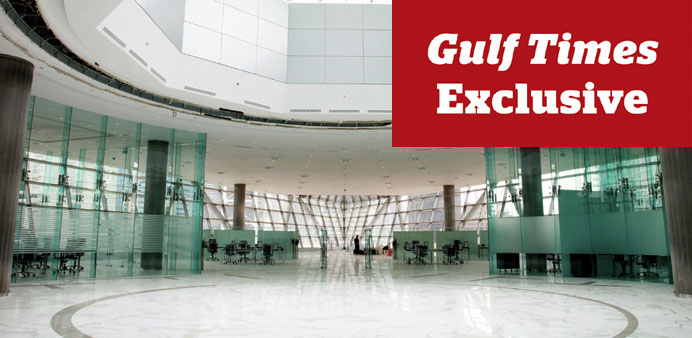A view of the trading floor at the Dubai Diamond Exchange in Dubai. After the Dubai Multi Commodities Centre (DMCC) came up with a Shariah-compliant commodity trading platform in 2013, things became easier for Islamic commodity traders in the Middle East.
By Arno Maierbrugger/Gulf Times Correspondent/Bangkok
Islamic commodity trading has become more popular in the financial world as of late because an accord seems to have been reached among scholars whether such commodity trading, which is conventionally done through futures contracts and not through the exchange of physical commodities, is permissible as per Islamic law.
So far, Islamic commodity trading has been done mostly by commodity murabaha whereby an institution agrees to purchase goods from a counterparty which promises to buy it back with an agreed mark-up at a later date. But some scholars have criticised that structure for its lack of economic substance as that there is no effective change in ownership of the goods, highlighting one of the most difficult dilemmas in Islamic jurisprudence that also extends to forex and stock indices trading. On the other hand, Islamic banks cannot use conventional interbank money markets because of Islam’s ban on interest, so they used to struggle with a shortage of instruments to manage liquidity.
Therefore, new solutions had to be found. After the Dubai Multi Commodities Centre (DMCC) came up with a Shariah-compliant commodity trading platform in 2013, things became easier for Islamic commodity traders in the Middle East. The concept is based on trading of warehouse receipts, which represent ownership of commodities stored at warehouses, rather than just “imaginary” price contracts, providing a solution to the problem that commodity trading should be based on physical assets as Islamic finance principles dictate.
The DMCC concept followed the Bursa Suq Al Sila, set up by the Malaysian stock exchange in Kuala Lumpur as early as in 2009 to serve as an Islamic commodity trading platform for crude palm oil, an initiative spearheaded by the Malaysia International Islamic Finance Center and a world’s first at that time.
The common understanding among scholars is that it is permissible to deal in commodities via the stock exchange and through future contracts if the conditions of valid transactions are fulfilled, one of which is that a person sells what he owns. This means, such a contract includes the right to get possession of the sold commodity and paying the price immediately. This means, “possession” or at least availability of a commodity, be it gold or petroleum or agricultural products or else, as long as not religiously prohibited, should be provided.
Adversely, it is not permissible to partake in commodity deals through transactions that are not real sales or real purchases and where the possession of commodities is not the objective, but just the trading of hypothetical delivery contracts in order to influence commodity prices without the risk of storing and transporting commodities for sale. The latter case scholars define as “gambling” or betting on prices which is impermissible, or haram, in Islam.
With the growing popularity of Islamic finance, Islamic commodity trading is now spreading slowly, but steadily into the conventional finance world. In a latest development, Sydney-based coal mining Waratah Resources Limited announced in April to launch an Islamic commodities trading business as it shifts focus from Asian markets to the Middle East. Waratah said it will setup a company domiciled in the Malaysian offshore finance centre of Labuan under a joint-venture agreement with Malaysia’s Amanie Holdings, an Islamic finance advisory firm. A few months earlier, New York-based commodity trader J. Aron & Company received $500mn from a sukuk issued by its parent company Goldman Sachs — mainly sold to investors in Qatar and the UAE — to use the proceeds in Islamic commodity trading, one of the biggest deals in the sector in the recent past.

